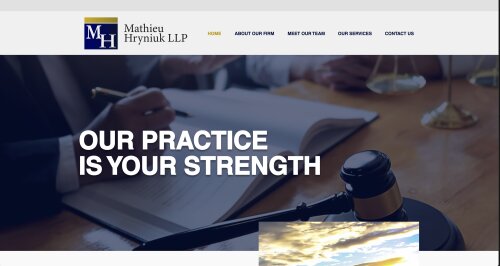Best Accounting & Auditing Lawyers in Toronto
Share your needs with us, get contacted by law firms.
Free. Takes 2 min.
List of the best lawyers in Toronto, Canada
About Accounting & Auditing Law in Toronto, Canada
The field of Accounting and Auditing law in Toronto, Ontario, Canada, ensures the transparency, accuracy, and legality of financial transactions and reports. The legal norms in this area are mainly based on the federal Canada Business Corporations Act (CBCA) and the provincial Business Corporations Act (OBCA). An essential role is played by entities like the Canada Revenue Agency (CRA) and the Chartered Professional Accountants of Ontario (CPA Ontario) in regulating and ensuring adherence to standards. Compliance with the GAAP (Generally Accepted Accounting Principles) and ISA (International Standards on Auditing) is crucial for businesses.
Why You May Need a Lawyer
Lawyers with expertise in Accounting and Auditing can assist in various scenarios. You may need a lawyer to clarify tax laws and represent you during tax audits. Legal advice is often needed while structuring a business or while planning mergers and acquisitions to mitigate financial risks. Lawyers also handle situations related to bankruptcy, restructuring, and insolvency. Furthermore, they can help in litigating corporate fraud or accounting malpractice cases. Misinterpretation or violation of accounting laws can lead to severe penalties, thus seeking legal advice can be a preventative and wise decision.
Local Laws Overview
In Toronto, the legal norms surrounding Accounting & Auditing are guided by both provincial and federal regulations. The Ontario Business Corporations Act (OBCA) outlines the requirements for audits in the province. The Canada Business Corporations Act (CBCA) specifies federal stipulations for audit processes. Important statutes also include the Income Tax Act and the Canadian Securities Administrators’ National Instrument 52-107. One significant aspect is the mandatory appointment of an Independent Auditor for public companies or in cases when not exempted by law.
Frequently Asked Questions
What are the criteria for a company audit in Toronto?
Both the CBCA and OBCA specify requirements for company audits. Companies, unless exempt, are required to appoint an auditor. Public companies, non-profit organizations, or large corporations typically require an audit.
Can a company be exempt from an audit?
Yes, companies can in certain circumstances be exempt from audits under the CBCA and OBCA. Usually, private corporations can opt-out if the decision is unanimously agreed upon by shareholders.
How does taxation work for companies in Toronto?
Toronto companies are subject to both federal and provincial taxes. The rates differ based on the type and size of the business, and there are certain deductions and tax credits available.
Can an auditor be liable for inaccuracy or fraud?
Auditors can indeed be held accountable for negligence, misrepresentation, or fraud under both civil and criminal laws.
What is expected in an audit report?
An audit report should provide an accurate, unbiased opinion on the company's financial status. It should verify that the financial statements comply with applicable standards and are free from misrepresentation.
How can a lawyer assist during a CRA audit?
A lawyer can guide you throughout a CRA audit process, ensuring all documentation and reporting is in order, represent you in discussions with the CRA, and assist in any subsequent legal disputes.
What role do the CPA Ontario and CRA play in Accounting & Auditing?
CPA Ontario regulates the accounting profession in Ontario ensuring adherence to ethical standards while CRA administers tax laws and conducts tax audits.
What measures can a business take for proper accounting and auditing compliance?
Regular internal reviews, maintaining accurate documentation, timely tax filing, adherence to GAAP and ISA, and seeking professional advice for complex transactions are effective measures.
What is a legal recourse in case of accounting malpractice?
Under Canadian law, victims of accounting malpractice can file a lawsuit against the perpetrators for damages resulting from negligence or fraud.
Can a business be penalized for incorrect financial reporting?
Yes, penalties can be severe for compliance failures, ranging from heavy fines to criminal charges depending on the severity and intent of the violation.
Additional Resources
Some useful resources include the official websites of the CRA and CPA Ontario, which provide relevant statutes, guidelines, and news. Other resources include the Ontario Securities Commission, the Financial Reporting & Assurance Standards Canada, and the Canadian Public Accountability Board.
Next Steps
If you need legal assistance in Accounting & Auditing, consider hiring a reputable lawyer experienced in this field. Research various professionals, their credentials, reputation and fees before making a decision. Prepare a summary of your case, gather all relevant documentation, and be ready to discuss it in depth. Remember that early legal consultation can often prevent severe legal issues down the line.
Lawzana helps you find the best lawyers and law firms in Toronto through a curated and pre-screened list of qualified legal professionals. Our platform offers rankings and detailed profiles of attorneys and law firms, allowing you to compare based on practice areas, including Accounting & Auditing, experience, and client feedback.
Each profile includes a description of the firm's areas of practice, client reviews, team members and partners, year of establishment, spoken languages, office locations, contact information, social media presence, and any published articles or resources. Most firms on our platform speak English and are experienced in both local and international legal matters.
Get a quote from top-rated law firms in Toronto, Canada — quickly, securely, and without unnecessary hassle.
Disclaimer:
The information provided on this page is for general informational purposes only and does not constitute legal advice. While we strive to ensure the accuracy and relevance of the content, legal information may change over time, and interpretations of the law can vary. You should always consult with a qualified legal professional for advice specific to your situation.
We disclaim all liability for actions taken or not taken based on the content of this page. If you believe any information is incorrect or outdated, please contact us, and we will review and update it where appropriate.















